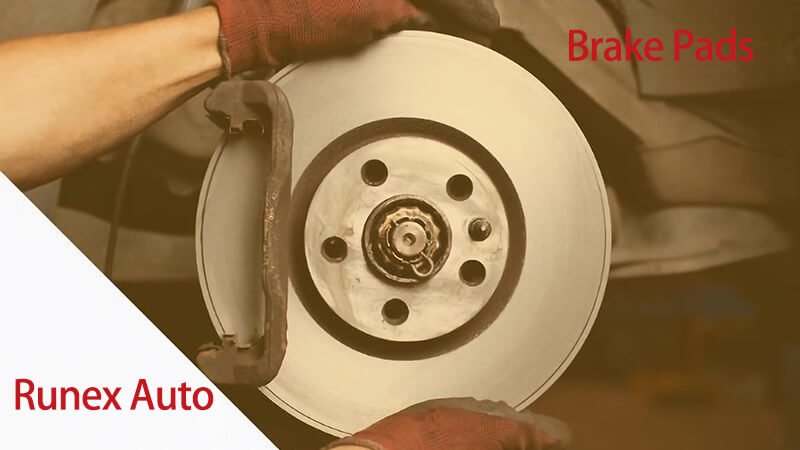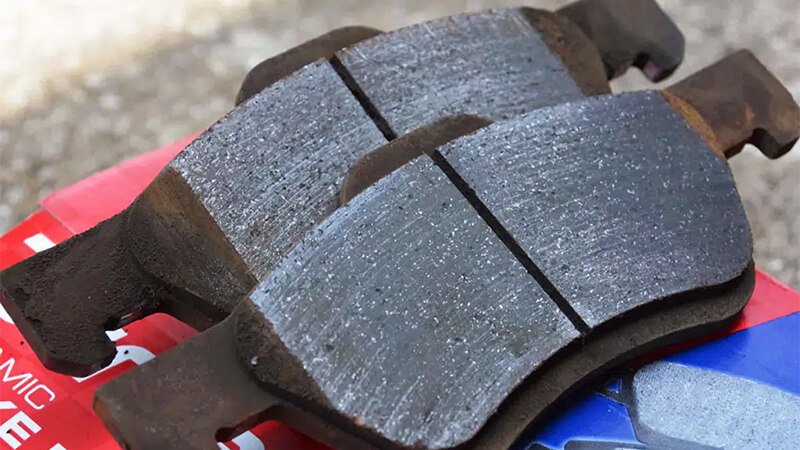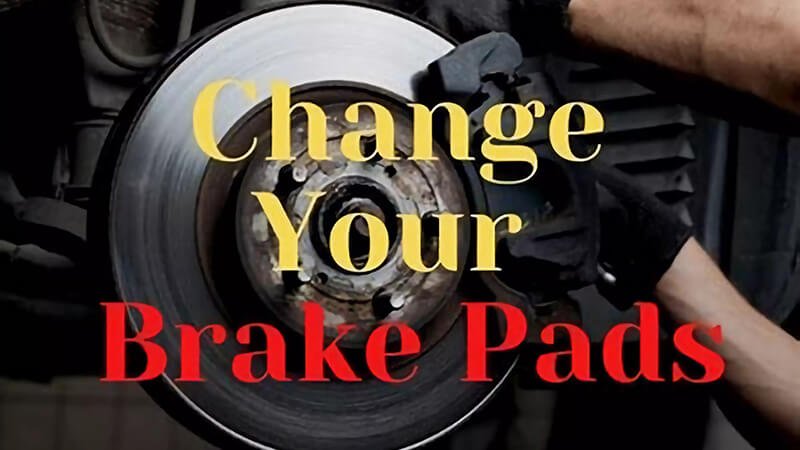When it comes to vehicle safety, choosing the right brake pads is critical. With so many options available, it can be difficult to know which one is best for your driving style. The right brake pads can make a significant difference in your car’s performance and safety.
Selecting the best brake pads for your car depends on your driving habits. Whether you're looking for performance, durability, or smoothness, the right brake pads should offer safety, comfort, and efficiency for your daily or aggressive driving needs.
In this article, we’ll guide you through the process of selecting the best brake pads for smooth and safe driving. We’ll cover everything from brake pads for daily driving to those suited for aggressive driving styles, helping you make an informed choice for your vehicle.

Which brake pads are best for daily driving?
For daily driving, comfort and reliability are key. The right brake pads1 can provide smooth, quiet stops while minimizing wear and tear on both the pads and the rotor. So, which type should you choose?
For everyday use, organic brake pads are often the best choice. They offer smooth and quiet braking with good performance for regular city and highway driving.
When choosing brake pads for daily driving, comfort and performance are the priorities. Let's explore the types of brake pads that best suit regular, everyday use.
1. Organic Brake Pads
Organic brake pads2 are typically made from a mixture of materials like rubber, carbon compounds, and Kevlar. These materials offer excellent stopping power while being relatively gentle on the rotor. They are ideal for regular, light to moderate driving conditions. Organic pads produce less dust, which helps to keep your wheels cleaner for longer.
While they tend to wear out faster than other types, organic pads are quieter and produce less noise. They offer a comfortable driving experience, especially for those who prioritize quiet rides and smooth braking. However, they may not be as durable as semi-metallic or ceramic pads in more extreme conditions.
2. Semi-Metallic Brake Pads
Semi-metallic brake pads3 are made of metal fibers mixed with other materials. These pads are ideal for drivers who experience diverse driving conditions. The metal content provides durability and high-performance stopping power, making them suitable for vehicles that travel on both highways and city streets. These pads tend to last longer than organic ones, but they may create more noise and dust.
| Material | Pros | Cons |
|---|---|---|
| Organic | Quiet, smooth, cleaner wheels | Shorter lifespan, not as heat-resistant |
| Semi-Metallic | Durable, better performance under heat | Noise, dust, rotor wear |
3. Ceramic Brake Pads
Ceramic brake pads are made from a dense ceramic material mixed with copper fibers. These pads are popular for daily drivers due to their long lifespan, minimal dust production, and quiet braking. They provide excellent performance in both city and highway driving conditions and are known for their ability to withstand higher temperatures than organic pads.
They are more expensive than organic pads but offer a superior balance between noise, dust, and performance. They are often used in higher-end vehicles where a smooth, comfortable driving experience is paramount.
For daily drivers, ceramic and organic pads are the best options. Both offer a quiet, smooth braking experience and are designed to work well under regular driving conditions without excessive noise or dust.

What are the best brake pads for aggressive driving?
If you’re someone who enjoys aggressive driving, you need brake pads that can handle the stress of high-speed stops and quick responses. The right brake pads4 for aggressive driving should offer superior performance and resilience.
For aggressive driving, performance brake pads5 made of semi-metallic6 or carbon composite brake pads7 are the best. These pads provide faster, more responsive stops and can handle the high heat generated during hard braking.
Aggressive driving puts more stress on your vehicle’s braking system. To handle the high demands of fast, hard stops, you’ll need pads that are designed for performance. Let’s look at the options available for this driving style.
1. Carbon Composite Brake Pads
Carbon composite brake pads are made from a combination of carbon fibers and other materials. These pads are known for their high-performance capabilities, offering excellent heat dissipation and minimal fade. The material’s strength allows these pads to maintain their effectiveness even during intense driving conditions. Carbon composite pads also provide quicker response times and better pedal feel, making them a great choice for aggressive drivers.
| Material | Pros | Cons |
|---|---|---|
| Carbon Composite | Excellent heat dissipation, durable | Expensive, can wear down rotors faster |
| Semi-Metallic | Great under extreme conditions | Noisier, more dust |
2. Semi-Metallic Brake Pads
Semi-metallic brake pads contain metal shavings, which make them ideal for handling high temperatures. They offer better performance under stress, which is important for aggressive drivers who need to stop quickly in high-pressure situations. While they are more prone to noise and dust compared to ceramic pads, the trade-off in performance is worth it for drivers who need superior stopping power.
Semi-metallic pads are known for their ability to handle more aggressive braking without fading, making them an excellent choice for high-performance and sports cars. However, due to the high metal content, they tend to create more noise and wear on rotors.
3. High-Performance Ceramic Brake Pads
High-performance ceramic brake pads are designed for aggressive driving while maintaining the benefits of regular ceramic pads. They are more durable and resist fading better than standard ceramic pads. These brake pads can endure high temperatures and provide strong, consistent performance under heavy braking conditions.
High-performance ceramic pads offer an ideal balance of comfort and performance, making them perfect for aggressive drivers who still want a relatively quiet, smooth ride.
For aggressive driving, carbon composite and semi-metallic brake pads are the best options. They can withstand high temperatures and heavy braking without sacrificing stopping power.

What type of brake pads stop the best?
When it comes to stopping power, not all brake pads8 are created equal. Some are designed for smooth, gradual stops, while others are built for high-performance braking. But which brake pads offer the best stopping power for your needs?
The best brake pads for stopping power are typically semi-metallic brake pads9 and carbon composite brake pads10. These materials provide the best performance for both everyday and high-performance vehicles.
Let’s explore the different materials used in brake pads and see which one offers the best stopping power.
1. Semi-Metallic Brake Pads
Semi-metallic brake pads are known for their excellent stopping power, especially under extreme conditions. They are made of metal shavings mixed with other materials, making them durable and heat-resistant. These pads offer quick response times, making them ideal for situations that require fast stopping. They are often used in performance and heavy-duty vehicles because of their high thermal capacity and consistent braking force.
The material's design allows for a greater friction coefficient, which improves overall braking effectiveness. However, they tend to wear rotors faster, creating more dust and noise. These pads are ideal for aggressive drivers or those who need maximum stopping power in demanding driving conditions.
2. Carbon Composite Brake Pads
Carbon composite brake pads11 offer incredible stopping power, especially in high-performance vehicles. These pads are designed to handle extreme temperatures and provide consistent performance, even during hard braking. They offer fast response times and high friction, making them the best choice for drivers who demand peak performance.
Despite their superior performance, carbon composite pads can be more expensive and may wear out faster than ceramic pads. They are, however, the preferred option for drivers looking for top-tier stopping power.
3. Ceramic Brake Pads
Ceramic brake pads are generally quieter and smoother but may not offer the same level of stopping power as semi-metallic or carbon composite pads. They are more durable and create less dust but may not be the best choice for aggressive driving. However, for regular driving, they still provide good stopping power while maintaining comfort.
| Material | Stopping Power | Durability | Noise |
|---|---|---|---|
| Semi-Metallic | High | Moderate | Noisy |
| Carbon Composite | Very High | Moderate to High | Noisy, aggressive |
| Ceramic | Moderate | High | Quiet, smooth |
For the best stopping power, semi-metallic and carbon composite pads are usually the way to go. They offer the strength and heat resistance necessary for high-performance braking.

Should brake pads be rough or smooth?
When you look at your brake pads, you may wonder whether they should have a smooth or rough surface. The texture of your brake pads12 affects their performance, so it’s important to understand the pros and cons of both options.
Brake pads should have a slightly rough surface to ensure proper friction with the rotor. A rougher texture helps to provide better grip and smoother, more efficient braking, especially during hard stops.
Let’s explore why brake pads need a certain texture to function properly, and how both rough and smooth surfaces affect their performance.
1. Rough Surface
A rough surface on brake pads allows for better friction between the pad and the rotor. This increased friction improves stopping power, especially in high-performance or aggressive driving situations. The rough texture also helps the pads to better “bite” into the rotor, which results in a quicker stop.
However, a rough surface can wear down both the brake pads and the rotors faster. This increased wear can lead to more frequent replacements of both parts, which may not be ideal for everyday drivers who are looking to save on maintenance costs.
| Texture Type | Pros | Cons |
|---|---|---|
| Rough Surface | Increased friction, better braking power | Faster wear on pads and rotors |
| Smooth Surface | Quieter, less rotor wear | Reduced stopping power |
2. Smooth Surface
Smooth brake pads tend to be quieter and create less dust. They are ideal for drivers who want a more comfortable, quieter driving experience. However, smooth pads may not provide the same level of performance in terms of stopping power, particularly under aggressive driving conditions.
In general, brake pads should not be too smooth or too rough. A slightly rough surface offers the best balance between effective braking and long-term durability. This texture helps to provide solid stopping power while reducing the risk of excessive wear on both the brake pads and the rotors.

Conclusion
Choosing the best brake pads for your vehicle depends on your driving style. For daily driving, organic and ceramic brake pads offer quiet, reliable performance. Aggressive drivers should opt for semi-metallic or carbon composite pads for better heat resistance and stopping power. Understanding the texture of brake pads is also important—slightly rough surfaces provide the best balance of friction and wear. Ultimately, selecting the right brake pads ensures smooth, safe driving and enhances your vehicle’s braking efficiency.
If you are looking for a reliable OEM Brake Pads Supplier13, don't hesitate to reach out to us14.
-
Learn about the function and types of brake pads in a vehicle. ↩
-
Understand the composition and benefits of organic brake pads. ↩
-
Discover the advantages of semi-metallic brake pads for diverse driving conditions. ↩
-
Learn about brake pads designed for aggressive driving and their functioning. ↩
-
Understand the importance of performance brake pads for high-performance driving. ↩
-
Discover the benefits of semi-metallic brake pads in aggressive driving conditions. ↩
-
Learn about the performance advantages of carbon composite brake pads for aggressive driving. ↩
-
Learn about brake pads and how they contribute to the overall stopping power of your vehicle. ↩
-
Discover why semi-metallic brake pads are known for their excellent stopping power and heat resistance. ↩
-
Learn why carbon composite brake pads offer superior stopping power in high-performance vehicles. ↩
-
Understand the advantages and limitations of ceramic brake pads in terms of stopping power. ↩
-
Understand the impact of smooth versus rough brake pad surfaces on braking efficiency and wear. ↩
-
Know more info about brake pads you need. ↩
-
Contact us to get your best products and solutions. ↩













